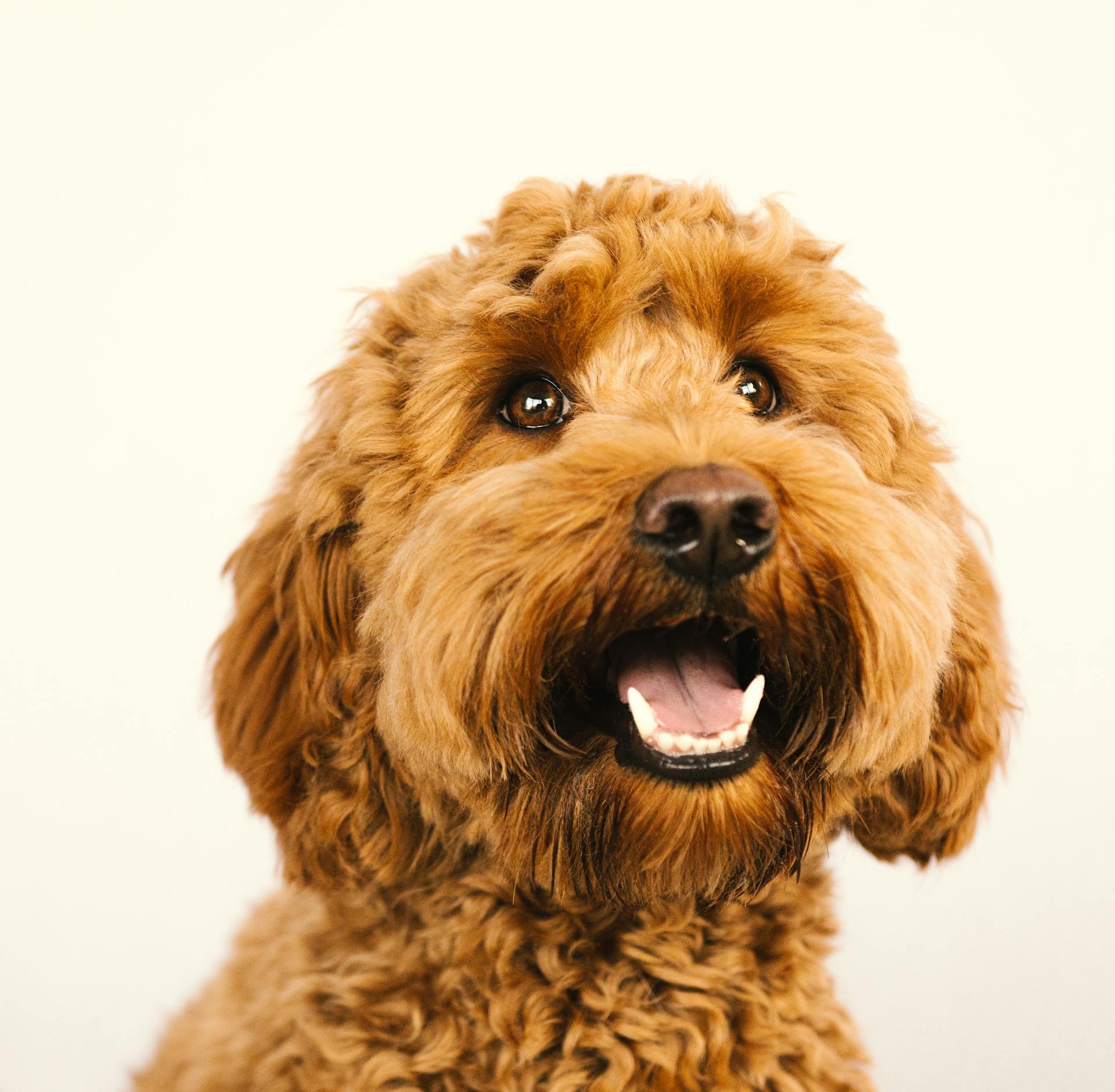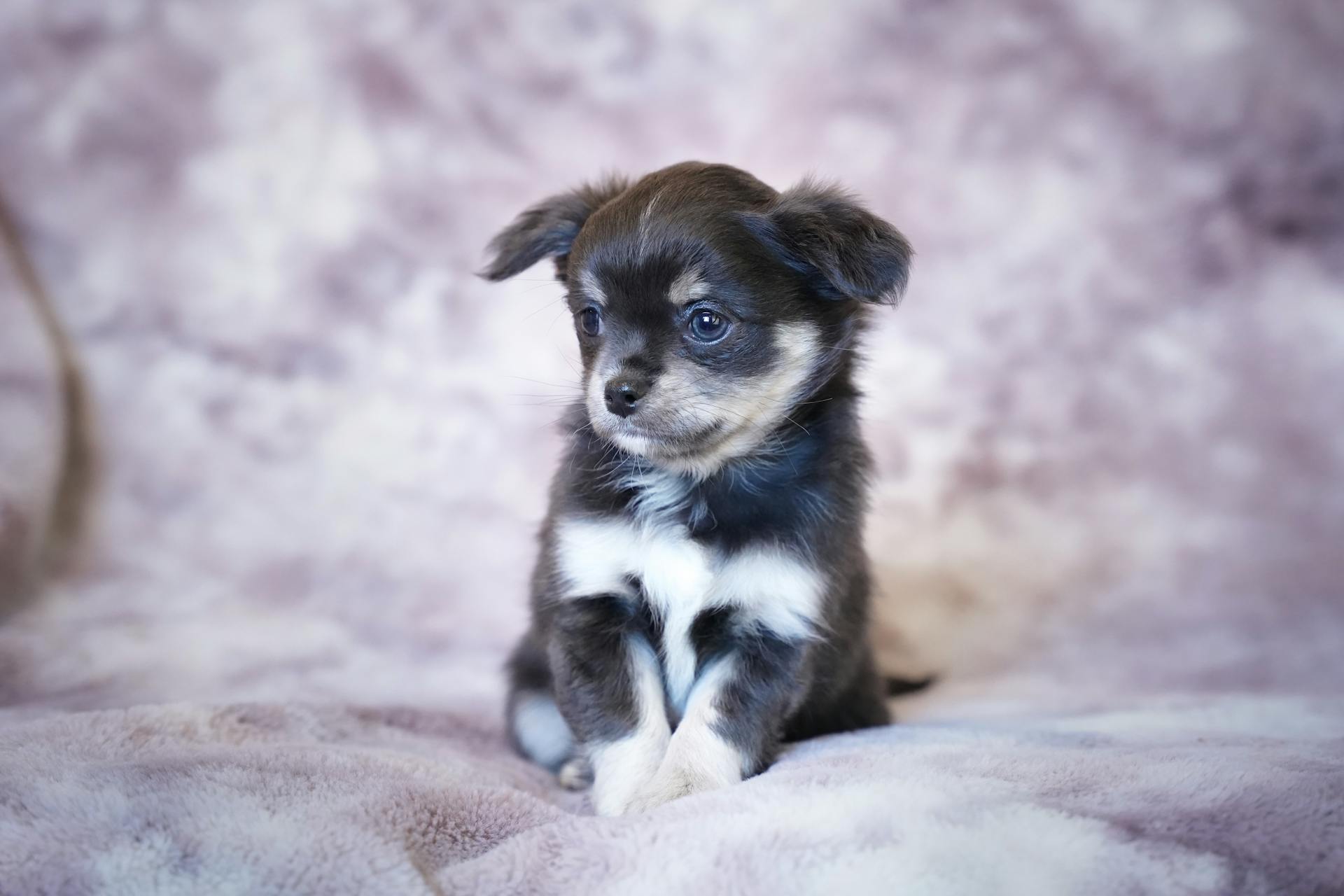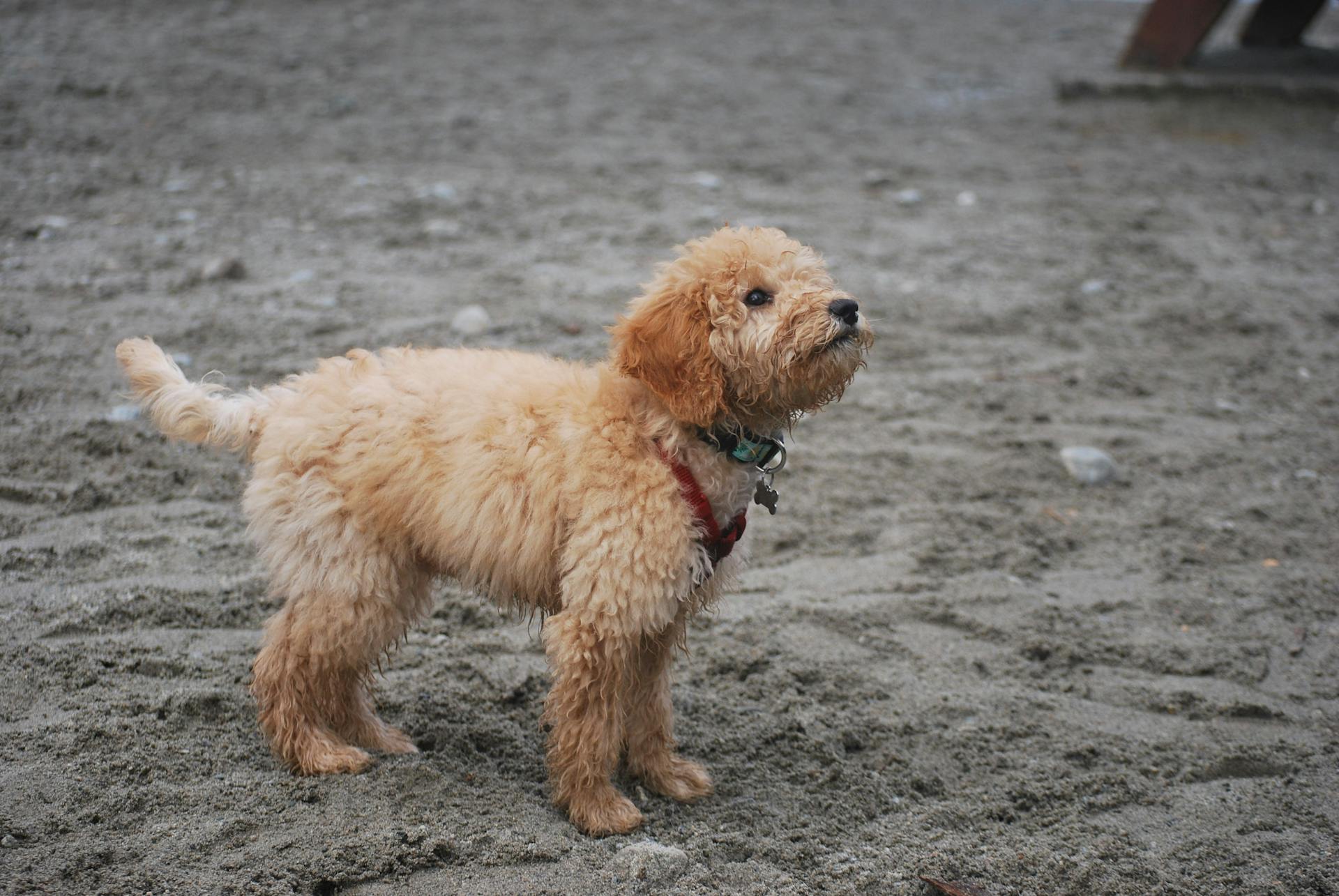
Goldendoodles are a popular crossbreed between a Golden Retriever and a Poodle, known for their friendly and intelligent nature.
They typically weigh between 15 and 80 pounds and stand between 15 and 24 inches tall.
Goldendoodles are often considered a low-shedding breed, making them a great choice for people with allergies.
Their coats can come in a variety of colors, including gold, black, and apricot.
Their intelligence and trainability make them highly responsive to commands and training.
With proper care and attention, Goldendoodles can live up to 10-15 years.
Their friendly and outgoing personalities make them a great addition to families with children.
Physical Characteristics
Goldendoodles come in a range of sizes, from the standard to the miniature. Their height and weight depend largely on their Poodle lineage. A standard Poodle parent will result in a full-size goldendoodle, while a Miniature Poodle parent likely reduces a pup's full-grown stature.
Standard goldendoodles can stand more than 21 inches tall and weigh up to 100 pounds. Miniature goldendoodles typically weigh no more than 35 pounds and stand less than 14–17 inches tall.
A different take: Photos of Mini Goldendoodles
Goldendoodles have a long-haired coat that can vary in texture and color. Their coat can be straight, wavy, or curly, with the wavy type being the most common. Wavy coated goldendoodles have loose, shaggy curls.
Their coat can come in a variety of colors, including cream, red, black, gold, apricot, brown, or a combination (parti-colored). They can also have a teddy bear gold hue, or even be multi-colored in rare cases.
Goldendoodles are often claimed to be 'hypoallergenic' or 'non-shedding', but research has shown that this can't be an official dog breed characteristic. Their double coat consists of a dense undercoat of short hairs beneath a top coat of longer hairs, called guard hairs.
Here are the common coat types of goldendoodles:
- Wavy: loose, shaggy curls
- Curly: thick and curly, similar to a Poodle's coat
- Straight: not as common as wavy or curly coats
Their eye color is typically brown, but can also be a combination of other colors.
Health and Wellbeing
Goldendoodles are generally very healthy dogs with a lifespan of 10-15 years.
However, they can be susceptible to certain health issues, including atopic dermatitis, ruptured cranial cruciate ligaments, seizures, hip dysplasia, patella luxation, and von Willebrand Disease.
Their floppy ears can trap moisture, making them more prone to ear infections than other dogs.
It's essential to request a health clearance from the breeder and ensure they conduct the necessary health tests, providing documentation when you buy your goldendoodle puppy.
Doing your research and identifying reputable breeders is crucial, as this breed has been around for many years and there's excellent research supporting the breed predisposition.
A fresh viewpoint: What Are Golden Doodles Mixed with
Health
Goldendoodles can be a healthy breed, with a lifespan of 10-15 years. However, they can be prone to certain health issues.
Their floppy ears can trap moisture, making them more susceptible to ear infections. This is especially true after water-related activities or bathtime.
Some health issues to watch out for include atopic dermatitis, ruptured cranial cruciate ligaments, seizures, hip dysplasia, patella luxation, and von Willebrand Disease.
Nutrition and Feeding
Large breed dogs, like Goldendoodles, have a unique nutritional need for a different balance of nutrients, including minerals and vitamins, compared to smaller-breed dogs.
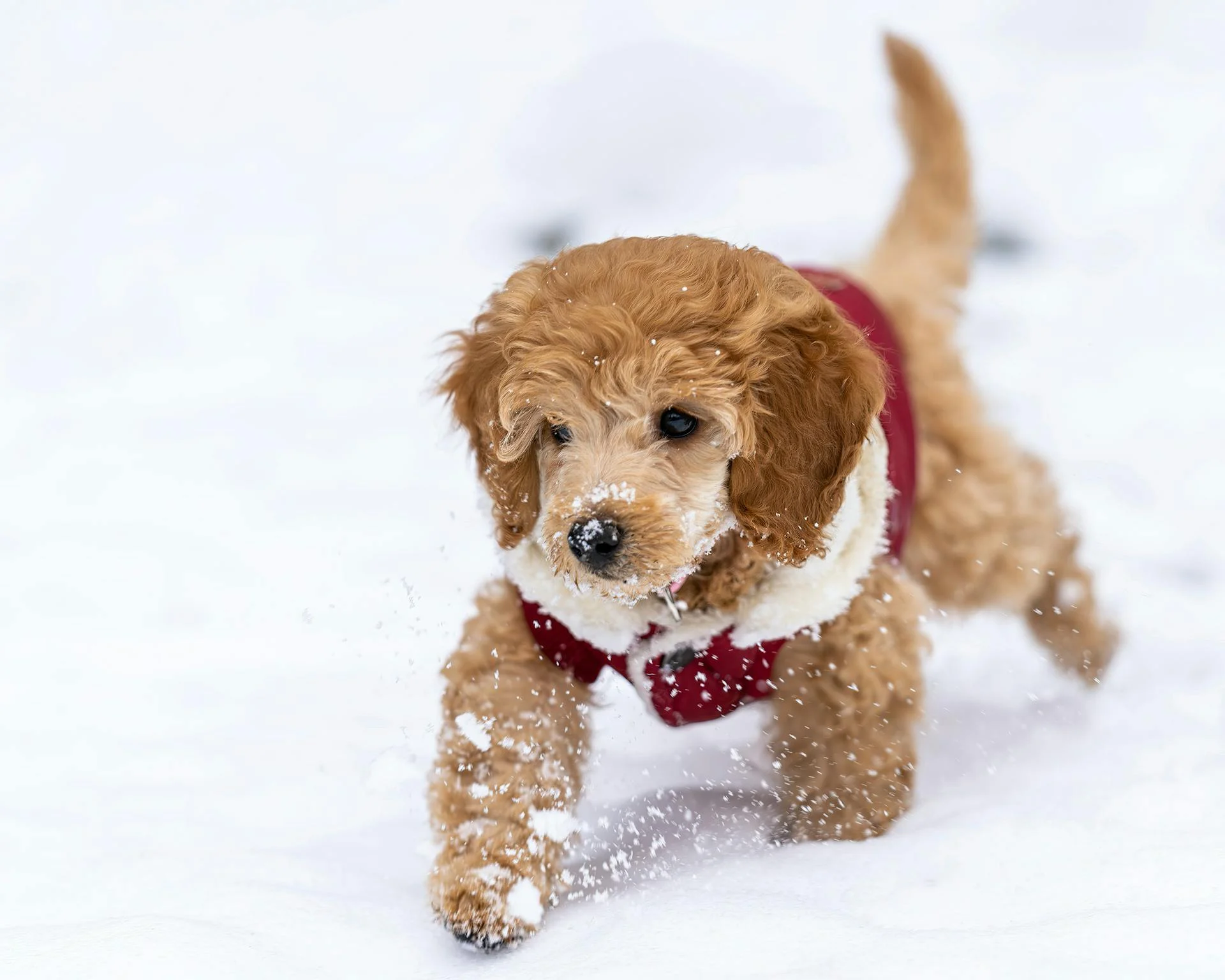
Their large appetites can sometimes lead to bloating and stomach problems, so feeding smaller, more frequent meals can help minimize this risk.
A constant supply of fresh water is essential for your dog's diet.
Regular body condition scores are crucial to ensure your dog stays in ideal shape.
Feed your dog at least twice daily, and follow the feeding guidelines of their particular food.
Behavior and Temperament
Goldendoodles are known for their friendly, affectionate, and trustworthy nature, inheriting these traits from their Golden Retriever side. They're often described as having a "teddy bear-like" personality.
These dogs are extremely loving and gentle, making them a wonderful option for families with young children. They're naturally inclined to be careful with infants and toddlers, and will be patient companions for children as they grow up.
Goldendoodles are highly social and need to be part of the family, requiring a lot of exercise and attention. They're prone to separation anxiety, especially as puppies, so it's essential to provide them with plenty of attention and interaction.
Their intelligence and trainability make them relatively easy to train, and they're eager to please their owners. They can learn some fun tricks and are obedient with proper training.
Goldendoodles are not happy unless they're with their people, and they think of themselves as full-fledged family members. They're laid-back and bashful, rarely meeting a human or fellow animal they don't like, even smaller critters like cats.
Their strong retriever instincts make them have an active mouth and high tendency to retrieve objects, so be prepared for a lot of fetch and playtime.
Exercise and Care
Goldendoodles need at least two hours of exercise per day, and they'll also enjoy games, training, and interactive toys.
They'll be happy with daily walks and some backyard play with a ball, and they love to play in the water. In fact, time in the sprinkler or a pond will make them the happiest dog in the world.
A goldendoodle needs daily brushing to avoid painful matting, but if they have a straight coat or a very short hairdo, weekly brushing sessions will be sufficient.
Breed Puppies
Finding a Goldendoodle puppy can be a challenge, but it's not impossible. You can start by checking with breeders through the Goldendoodle Association of North America (GANA), which sets the standard for the breed and ensures parent dogs have had their health clearances.
If you're looking for a puppy in a shelter, be prepared to act fast - they tend to get snatched up quickly. Daily visits to your local shelter may be necessary to find a Goldendoodle available for adoption.
The first few months of a Goldendoodle's life are crucial in determining their temperament and energy level. With proper care and attention, they'll grow into a happy and healthy companion.
Care
Goldendoodles need consistent grooming to keep their coat healthy, and they'll require a professional groomer every 6-8 weeks.
Daily brushing is a must to avoid painful matting, especially for doodles with curly coats. If your goldendoodle has a straight coat or a very short hairdo, weekly brushing sessions will suffice.
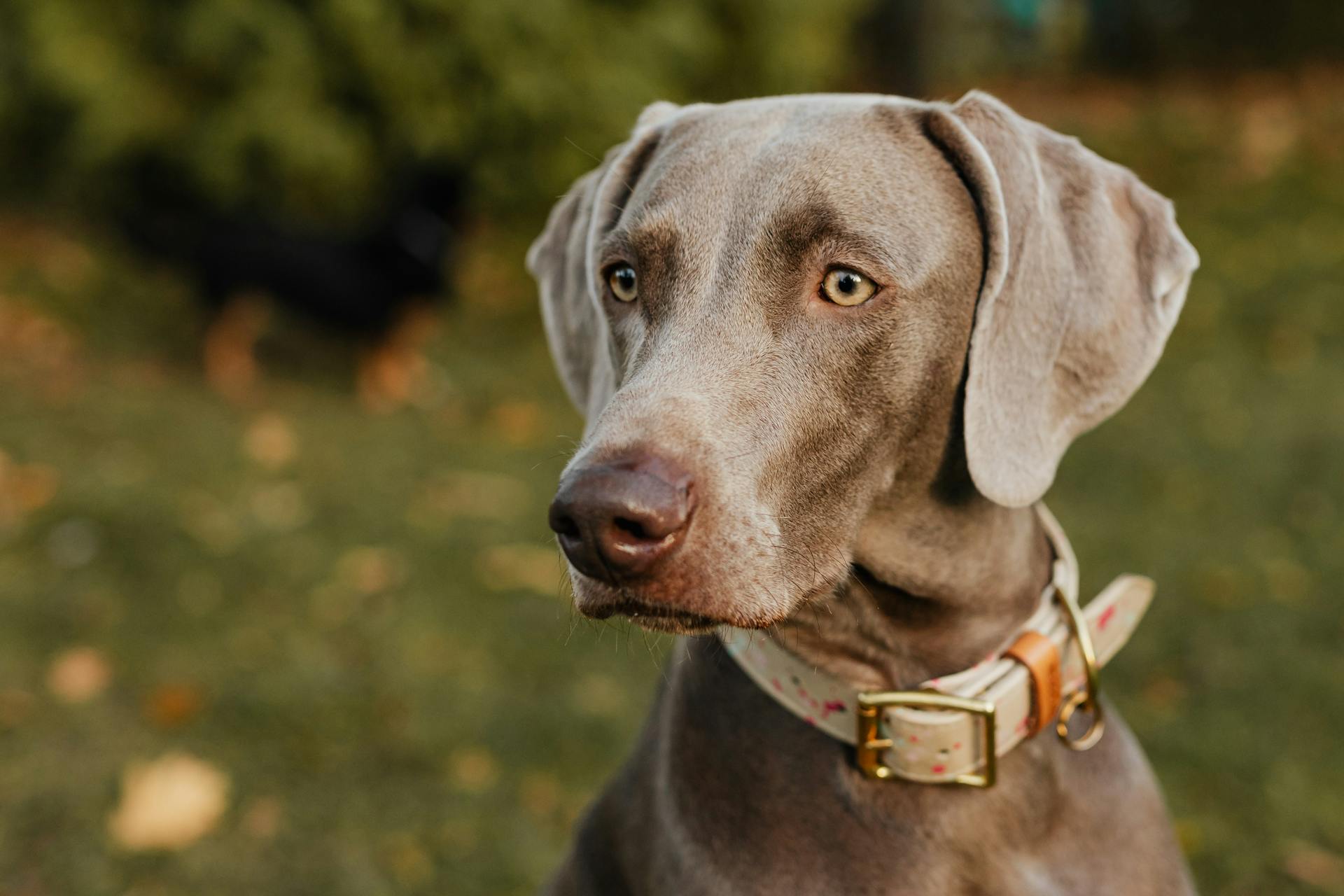
Goldendoodles of all sizes need about half an hour of physical activity every day, and a fenced backyard makes exercise easy. A brisk walk around the neighborhood will also do.
Doodles love social interaction with humans and playdates with fellow pups, so they generally shouldn't be left home alone for long periods of time. A lonely or bored goldendoodle can develop separation anxiety and exhibit undesirable behaviors.
Goldendoodles are quick to learn and eager to please, making them excellent for first-time dog owners. They do best with positive reinforcement training and rewarding good behavior with treats.
Proper socialization and attention should start early and continue throughout the dog's life to ensure good behaviors. This will help prevent undesirable behaviors like digging or barking.
Goldendoodles of all sizes require daily exercise and play, whether that's a morning walk or a backyard fetch session – or both!
Consider reading: Are Goldendoodles Good with Kids
Training and Suitability
Training a Goldendoodle requires patience and consistency, as they can learn bad habits as quickly as good ones. They thrive on reward-based training, especially if started early.
Goldendoodles are highly intelligent and eager to please, making them relatively easy to train. They can excel in service dog training and do well in just about any type of training.
However, Goldendoodles can be sensitive, so it's essential to use gentle, positive training methods to avoid worrying them. They respond well to "gentle parenting" techniques, which promote a calm and trusting relationship.
Training
Goldendoodles are highly intelligent and relatively easy to train, thanks to their eager-to-please personality.
They can do well in just about any type of training, and they excel in service dog training. Start them in a puppy training program first to teach basic commands.
Goldendoodles are very sensitive, so it's essential to use gentle training methods instead of harsh techniques.
Reward-based training should start early and be ongoing, as they will learn bad habits as quickly as good ones.
Positive and reward-based training is a must, especially for Goldendoodles that can be more sensitive than Labradoodles.
They will love having an active job to do, making dog sports like agility or pet gundog work a great fit for this breed.
A fresh viewpoint: Do Goldendoodles Have Sensitive Stomachs
Family Suitability
If you're considering bringing a Goldendoodle into your family, you'll be happy to know they can make fabulous family dogs if sourced from a reliable breeder and well-trained from puppyhood.
They'll get on with everyone, but it's essential to provide them with plenty of exercise and mental stimulation to prevent unruliness and boisterous behavior.
Goldendoodles are very versatile and can adapt to any kind of lifestyle, whether you live in an apartment or have a large family and farm.
They'll do well in homes with small children, who will love playing and snuggling with them, but they also don't mind lounging about a house all day waiting for their owners to return from work.
With the right care and attention, a Goldendoodle can be a life-long friend for your family.
Popularity and Uses
Goldendoodles have become incredibly popular as companion dogs, and for good reason - they make amazing friends.
They're highly trainable, which is why many goldendoodles have been successfully trained as therapy dogs, guide dogs, and nut-detection dogs for people with nut allergies.
See what others are reading: Goldendoodles Hypoallergenic Dogs
In the United States, goldendoodles have become one of the most popular dog varieties in some regions.
In Australia, they were named one of the top twenty most popular dog varieties in 2020, with prices for a puppy skyrocketing from $3,500 AUD pre-pandemic to as much as $15,000 AUD by September 2020.
Even celebrities like American musician Usher have fallen in love with goldendoodles, paying $12,000 for a puppy in a 2012 charity auction.
Despite their growing popularity, goldendoodles remain unrecognized by prominent canine organizations like the American Kennel Club (AKC) or British Kennel Clubs due to their hybrid status.
For another approach, see: How Popular Are Goldendoodles
Fun Facts and History
Goldendoodles have a huge following in Australia, where they're affectionately called "Groodles." They've also gained popularity in the US, with many celebrities owning them, including Paula Deen and Perez Hilton.
Meet Samson the goldendoodle, who has over 1 million followers on Instagram. Their adorable faces and charming personalities have captured the hearts of many dog lovers.
Goldendoodles made their official debut in the 1990s, but they existed in some form for centuries beforehand. The first Mini Doodle litter was born in 2002, and the first official Doodle standard was set in 2017.
Here are some fun nicknames for goldendoodles: Groodles, golden poos, goldie poos, or curly goldens. These cute variations have become popular among dog owners and enthusiasts alike.
Goldendoodles are known for their friendly and social nature, inheriting a happy-go-lucky attitude from their golden retriever parents. They make great emotional support animals and therapy dogs, and their hypoallergenic coats are a big draw for many owners.
History
The Goldendoodle breed has a fascinating history that dates back centuries, but its modern popularity began in the 1990s.
The exact origin of the Goldendoodle crossbreed is unknown, but breeders started marketing these dapper doodles after the Labradoodle gained popularity.
One of the biggest appeals of both crossbreeds, including Goldendoodles, is their hypoallergenic coat.
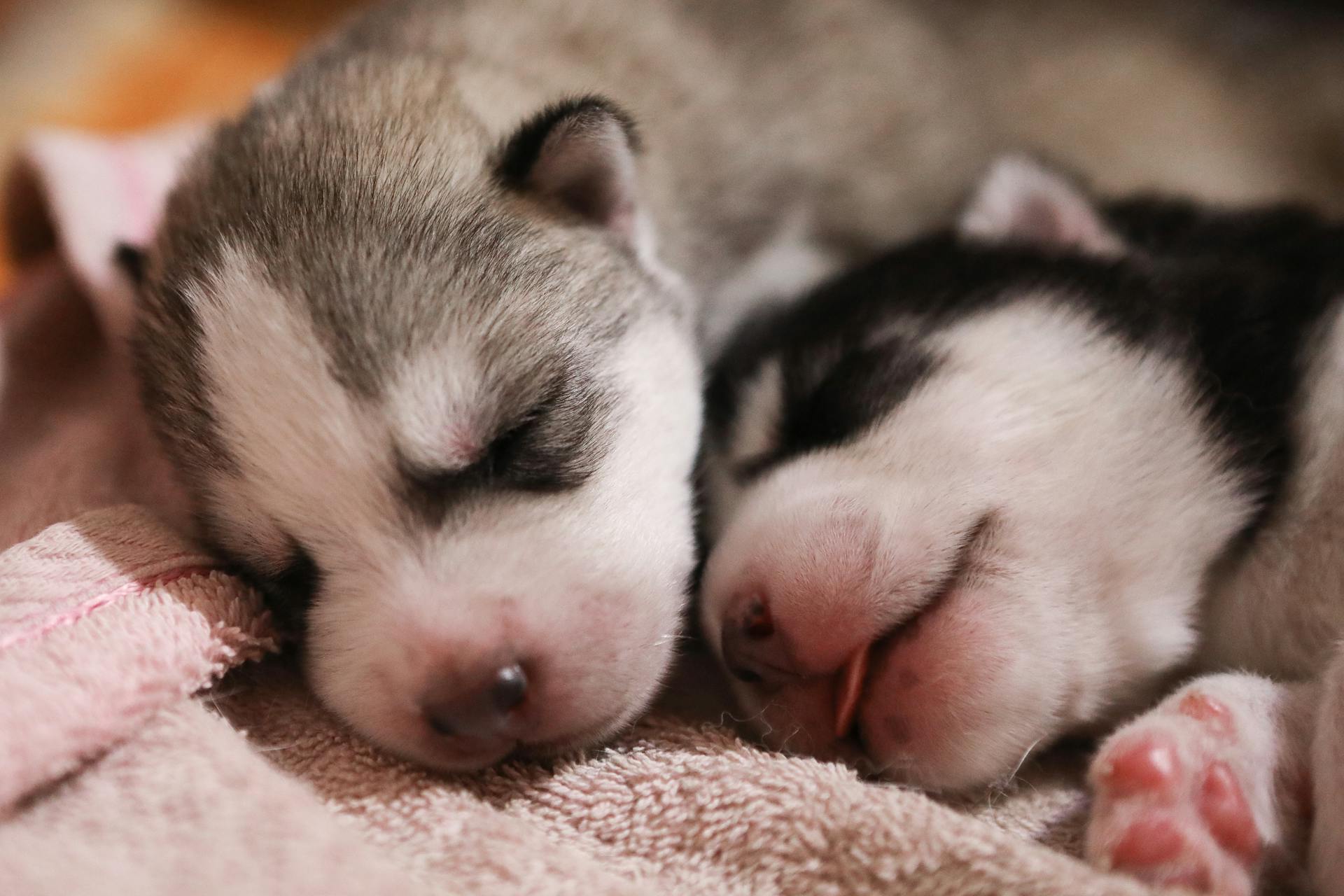
Goldendoodle coats can be longer and wavier, thanks to their golden retriever genes, making them slightly different from Labradoodles.
Both Goldendoodles and Labradoodles are friendly, but Goldens are generally more enthusiastic about meeting new people.
Goldendoodles inherited a social, happy-go-lucky attitude from the golden retriever that differentiates them from Lab-mix cousins.
Goldendoodles were created to be emotional support animals and therapy dogs, in addition to being guide dogs.
Breeders began taking requests for more variations, introducing new sizes and traits to please all sorts of dog owners, including petites and minis.
The Goldendoodle may be one of the newest poodle mix crossbreeds, but its popularity is still on the rise.
You might like: Do Labradoodles Shed More than Goldendoodles
3 Little-Known Facts
The Goldendoodle is a popular breed, but did you know that it's not currently recognized by the UK Kennel Club as it's a mixed breed?
Goldendoodles are known for being friendly and affectionate, which is why they make excellent assistance dogs. They've been used as guide dogs, service dogs, therapy dogs, and even sniffer dogs.
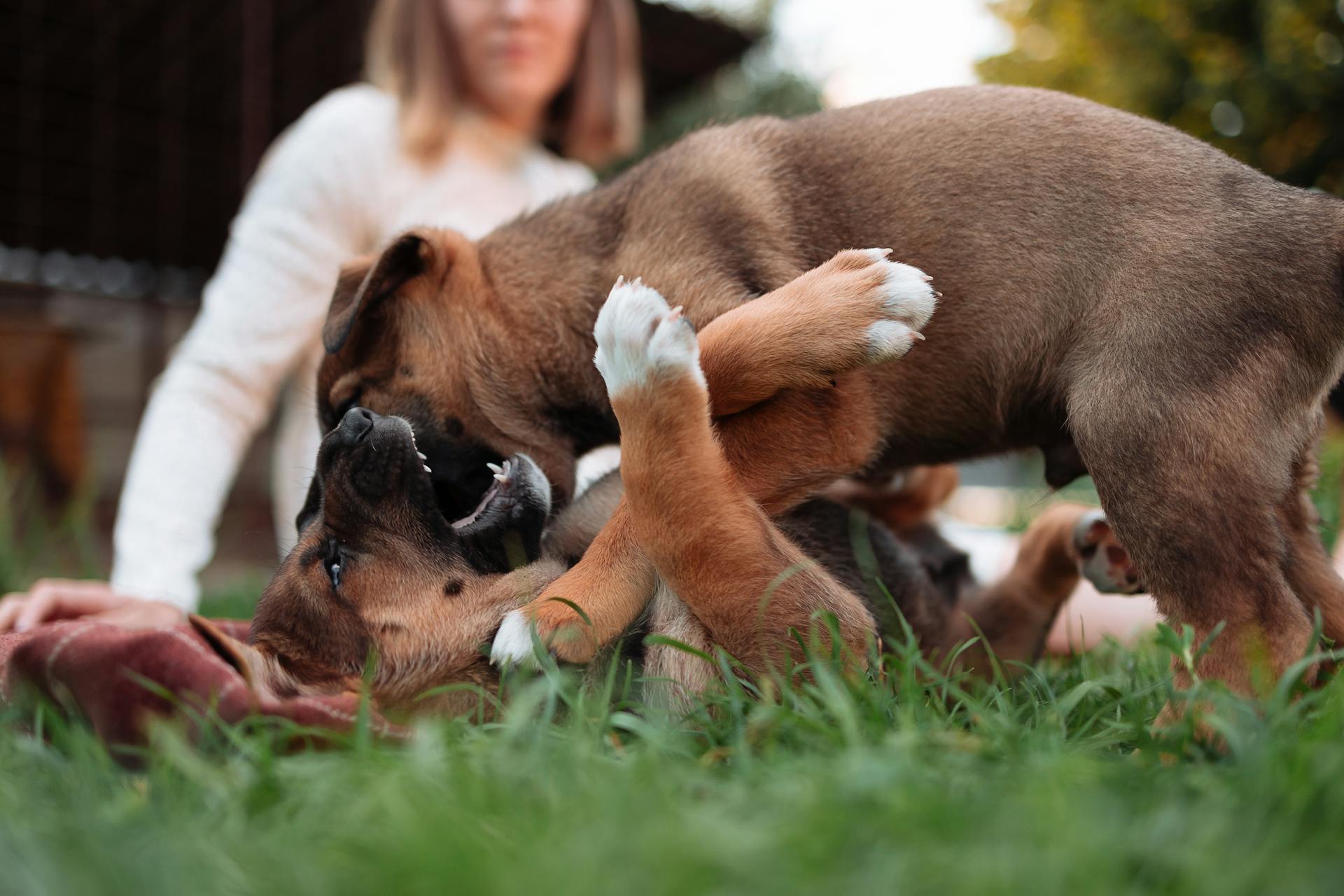
If you're thinking of getting a Goldendoodle as a guard dog, think again! They're not very good at barking at strangers, and would rather lick them instead.
Here are some interesting facts about Goldendoodles in a nutshell:
- Goldendoodles make excellent assistance dogs.
- They're not very good guard dogs.
- They're sometimes known as the 'Groodle'.
14 Cute Facts
Goldendoodles have a huge fanbase in Australia, where they're affectionately known as "Groodles" or "golden poos."
Paula Deen, the famous TV personality and cookbook author, has a cream goldendoodle named Gus who loves her homemade peanut butter dog biscuits.
These dogs are so adorable that they've got a celebrity following - Perez Hilton, Usher, Jensen Ackles, and Kenny Chesney all have goldendoodles.
You can even find them on social media, with Samson the goldendoodle having more than 1 million followers on Instagram.
Here are some of the cool name variations for goldendoodles: "goldie poos", "curly goldens", and "Groodles."
Frequently Asked Questions
What are the pros and cons of a Goldendoodle?
Goldendoodles are friendly and sociable, but may develop social anxiety. They have a hypoallenic coat, but may cause allergic reactions in some people, and shed moderately
Are Goldendoodles hard to take care of?
Goldendoodles require regular grooming and outdoor playtime, but can be a great fit for active owners. If you're looking for a lower-maintenance option, consider a mini Goldendoodle or Labradoodle.
What are Goldendoodles best known for?
Goldendoodles are renowned for their exceptional health, intelligence, and gentle nature, making them a beloved breed among pet owners. Their unique combination of characteristics has captured the hearts of many, making them a popular choice for families and individuals alike.
Featured Images: pexels.com
